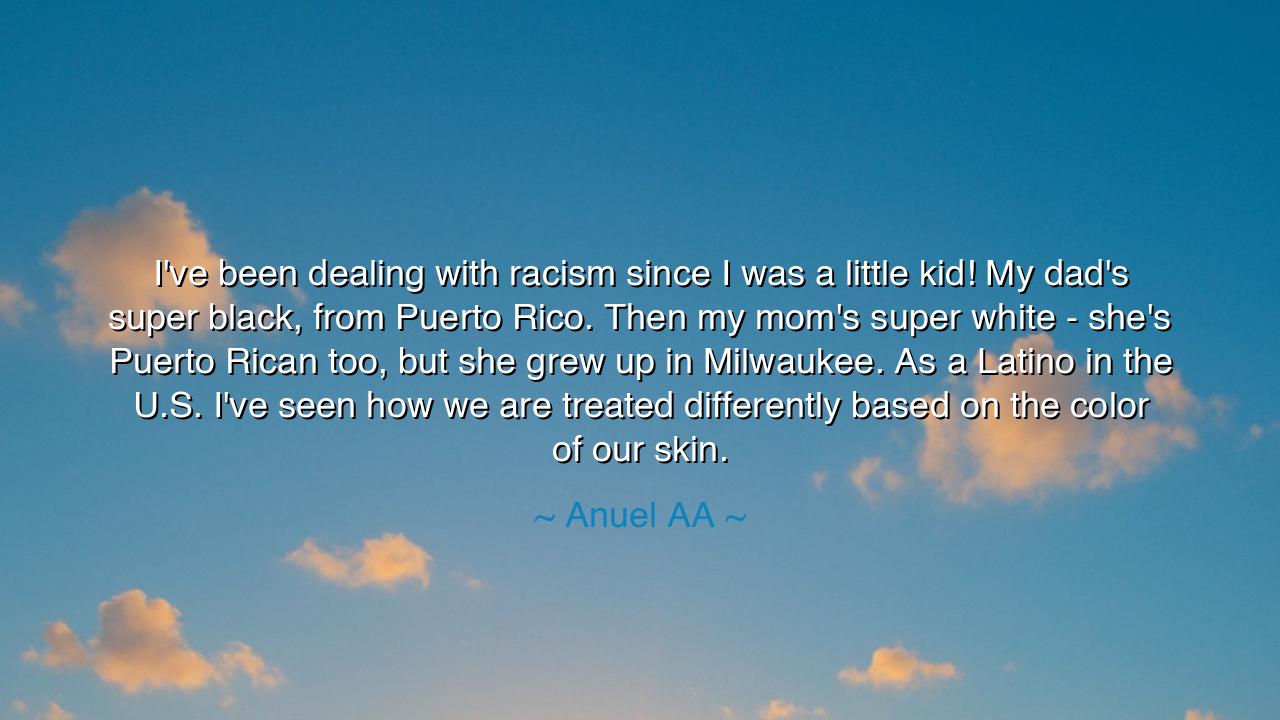
I've been dealing with racism since I was a little kid! My dad's
I've been dealing with racism since I was a little kid! My dad's super black, from Puerto Rico. Then my mom's super white - she's Puerto Rican too, but she grew up in Milwaukee. As a Latino in the U.S. I've seen how we are treated differently based on the color of our skin.






In a voice shaped by struggle and self-awareness, Anuel AA declared: “I’ve been dealing with racism since I was a little kid! My dad’s super black, from Puerto Rico. Then my mom’s super white — she’s Puerto Rican too, but she grew up in Milwaukee. As a Latino in the U.S., I’ve seen how we are treated differently based on the color of our skin.” These words rise not as complaint but as testimony — the voice of one who has walked between worlds and borne the weight of misunderstanding. They remind us that the human heart, though one in essence, is still judged by the surface it wears. In his confession lies both pain and revelation: the recognition that the world still struggles to see beyond the color of the flesh to the brilliance of the soul.
To the ancients, such division among men would have been a tragedy of spirit. The wise taught that all beings share the same divine spark — that the breath of life flows from one source, though it animates many forms. Anuel’s reflection is the modern echo of that eternal truth: that identity is not bound to shade or origin, but to the moral light that dwells within. Yet history, blind in its ignorance, has long chained men to appearances. And so, even in the modern age, a child of both black and white, of both Caribbean and American lineage, finds himself questioned — his belonging suspended between colors.
This pain is not new. Consider the story of Frederick Douglass, born a slave to a white father and black mother, his very existence marked by contradiction. The world told him he was less, that his mind and body were owned. Yet Douglass, through courage and wisdom, defied those chains. He rose to speak before kings and nations, declaring that no man’s worth should be weighed by his skin. Like Anuel, he lived in the space between worlds — and it was from that space that his clarity was born. Both men remind us that identity, when forged in adversity, becomes unbreakable.
When Anuel AA speaks of being Latino in the United States, he gives voice to millions whose heritage is complex, whose cultures blend many shades and tongues. The Latino spirit is one of mixture — of Africa, Europe, and the Americas — yet even within that richness, society too often divides what nature has united. His father’s blackness, his mother’s whiteness, his own in-between reality — all form the tapestry of his being. To him, every glance, every judgment, every act of exclusion becomes a lesson in resilience. It teaches the soul to find strength not in acceptance by others, but in acceptance of oneself.
The wisdom of his words lies in the understanding that racism does not only wound the individual — it weakens the collective. A society that judges by color blinds itself to genius, compassion, and creativity. Anuel’s journey is proof that greatness arises not from privilege but from perseverance. The music he creates, the life he lives, the voice he lends — all are acts of resistance against the ignorance that sought to silence him. In every lyric, he transforms pain into power, and in doing so, he continues the legacy of those who fought for dignity before him.
But beyond his personal story, there is a greater call: that every man and woman must confront the prejudice within themselves. For racism is not only a system — it is a shadow in the heart, born of fear and unexamined thought. To overcome it, one must practice empathy, to see through the eyes of another, to recognize in every face a reflection of one’s own humanity. Only when we embrace the fullness of our shared diversity can we begin to heal the centuries of division that have scarred the world.
Let this teaching, then, be carried forward: Judge no one by their skin, but by the light they carry. Remember that strength lies in unity, not separation. The child of many colors is not confused — he is whole. The one who endures prejudice with dignity becomes a beacon to others still walking through darkness. And the society that learns to love its differences will be richer than any empire.
Thus, the teaching concludes: Anuel AA’s words remind us that identity is a journey — a pilgrimage through pain toward self-understanding. He shows us that out of struggle can come compassion, and out of rejection can come greatness. Let each of us walk the same path — to see with clear eyes, to speak with courage, and to live with the wisdom that every human being, whatever their color, carries the same divine fire within.






AAdministratorAdministrator
Welcome, honored guests. Please leave a comment, we will respond soon